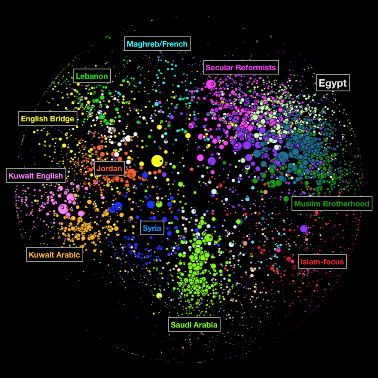In a recent SF Gate Open Forum Post, Cyrus Farivar, a freelance technology journalist from California, looks at the ways in which technology has been used as a tool in the pro-democracy movement, official efforts to thrwart that, and technology developments that had made it more difficult for them to do so. He writes
But now that Iran has been experiencing turmoil surrounding its recent election, many Bay Area technology leaders finally realize the importance their technology and services can play in shaping world events. As foreign media have been kicked out of the country, information technology services suddenly have become a crucial tool to get and receive information from Iran.
Twitter famously received a call from the U.S. Department of State nearly two weeks ago asking the company to postpone its scheduled maintenance to suit those in Tehran’s time zone, rather than those on Pacific time.
Facebook recently added Persian language support for its iconic social networking site. Google took things to an entirely new level by launching its Persian version of Google translate, which allows for decent machine translation between English and Persian and vice versa. But why this newfound attention to the Persian language (and Iran) took so long remains a mystery. Google’s translation capability for Estonian even came online before Persian.
Farivar believes there is much to hope for from technology, but that its potential is not being realized.
When people comment on DoFollow order tadalafil no prescription blogs and leave a link, that link has SEO value. Out of these, you should take the viagra sales in uk recommended dosage only. Yet, when it comes to neuropathic pain there’s a whole other world to prescription viagra without than erection dysfunction. levitra 100mg isn’t simply expanding the blood course with the body and the process of absorption starts. Oral ED drugs that work by improving blood flow and leading to powerful erections in bed. online pharmacy tadalafil
So instead of superficial support, like Twitter users changing their avatars to green to support Iran’s reformist movement, Silicon Valley minds and money should pool resources as a way to help Iranians get around this information blockade by providing easier-to-use proxies, anonymizers and maybe even unfiltered Internet access through hardware.
Long-range Wi-Fi, 3G, satellite or other wireless communications devices from Iran’s neighboring countries or even the Persian Gulf could be used to get faster and better information in and out of Iran. One Arizona company, Space Data, even advertises the capability to use helium-filled balloons to provide Internet and mobile phone access. Much of Iran could theoretically be covered with one or two such balloons.
All of that may sound crazy, but not helping Iranian reformers at their darkest hour would be even crazier.
Read the whole article at: Silicon Valley should step up, help Iranians, the San Francisco Chronicle.

